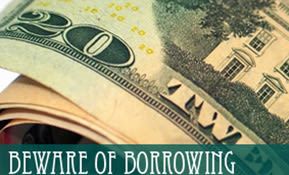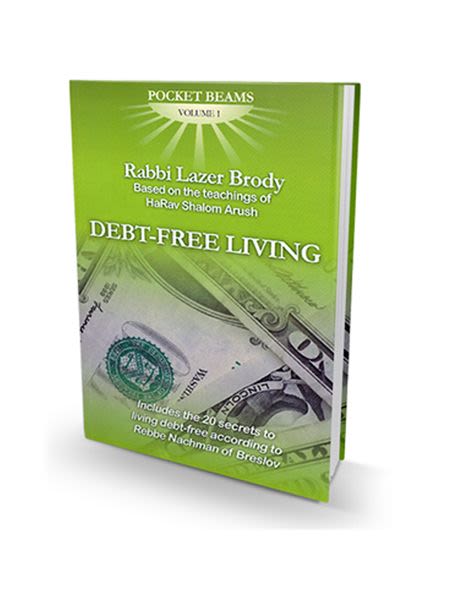
Borrowing and Bickering
A person who lives within his means doesn’t tremble every time the phone or the front doorbell rings. He doesn’t avoid people and sleeps like a baby at night.

The Garden of Bliss, Part 6
Rabbi Shalom Arush exposes the folly and fallacy of “plastic purchasing” and living beyond one’s means. Debts destroy domestic harmony more than anything else…
The Sefer Hamidot says, “Strife does not exist in one’s home unless there is insufficient income.” Being in debt automatically causes tension and discord in the home. Even a person who by nature is generous with his money will find himself constantly arguing over money and scrutinizing every household expense when under pressure to repay his debts. A woman under this type of pressure is incapable of fulfilling her spiritual potential. Rather, she feels empty and depressed.
All women have a deep emotional need for financial security. They need to feel that there is sufficient income to cover the family’s basic expenses. Therefore, a husband under financial pressure negatively impacts his wife. Her emotional equilibrium is shaken to the core and she becomes overwhelmed with a feeling of sadness and inability to cope. If the debts grow to such an extent that the family’s entire income is used to cover them and there is nothing left to pay the mortgage or the rent and to purchase basic necessities such as food and clothes, the couple’s domestic harmony is on very shaky ground.
A lack of domestic harmony has a negative influence on a person’s ability to earn a living – and the situation is a negative downward spiral. There is no domestic harmony – so there is not blessing in one’s livelihood; and when there is no blessing in one’s livelihood, the debts increase; and when the debts increase, one’s domestic harmony becomes even shakier, and so the spiral plunges downward, and the situation quickly deteriorates.
There is a vast difference – like the difference between the heavens and the earth – between living in poverty, but without debts, and between living comfortably, with debts. Although at times it might be very difficult, a person who is careful with his money and manages with the bare minimum without owing a penny to other, is blessed with emotional serenity. “Thank God,” he smiles to himself. “I do not owe anyone anything! As King Solomon said, ‘Better is a dry morsel and serenity therewith, than a house full of feasting with strife’ (Proverbs 1:1).”
A person who lives within his means does not tremble at the sound of someone knocking at his door or of the telephone ringing. He is able to walk freely down the street, without having to worry that he’ll run into one of the many people to whom he owes money. He is not causing anyone harm, and therefore people don’t hold a grudge against him. Basically, he and his family are able to live a normal, happy life, even if they are far from well-off.
On the other hand, a person who is heavily in debt enjoys a higher standard of living than what he can afford, but his supposed prosperity is at other people’s expense. Although it appears as if that person is “living the good life,” in reality his life is full of suffering.
It’s the husband’s responsibility to provide for his family. Therefore, a husband should make time to pray. He should ask Hashem to provide for him and his family. He should also take every feasible step on a practical level to make sure that the family has sufficient income.
Impact on Children
When children grow up under the ominous shadow of debt, constantly hearing their parents argue about money, money, money, discussing money, money, money and worrying about money, money, money, they grow up with the false belief that life revolves around one thing: money, money, money. As adults, they end up with an insatiable overwhelming hunger for money.
In addition to growing up with an insatiable hunger for money, children who grow up seeing their parents constantly in distress from the pressure of being in debt have irrational fears and phobias. Children are incapable of understanding the difficulties that their parents’ face and view their parents as all-powerful source of all their needs. When a child grows up with the fear that his parents are unable to adequately provide for his needs, he loses confidence in the world in general. He becomes depressed, overwhelmed with groundless worries, and jealous of what he considers to be his better-off friends.
Just imagine the impact of having to watch such things as government officials confiscating furniture and appliances in lieu of payment on the debts; parents constantly yelling and screaming at each other, parents hiding when a stranger knocks on the door, parents avoiding people on the street, parents begging the bank manager to wait just a few more days before foreclosing the mortgage, etc., etc. The trauma of seeing such things leaves a deep, negative impact on children’s emotional health. In most cases, this negative impact will last for years and be the cause of much suffering for their entire life.
As we wrote above, there is a tremendous difference between living under the shadow of debt and living in poverty, but with the emotional serenity and without the anxiety of being in debt. Without debt, there is less tension in the home, which, in turn, leads to less arguments. With less tension and less arguments, parents are able to attain a loving, stable relationship, and children who grow up in a loving, stable home feel, for the most part, wanted and loved. Such children are usually happy and emotionally stable and grow up to be happy and emotionally stable adults.
When parents are satisfied with what they have, even if it is very little, and do not have an excessive desire for material goods, especially material goods that are beyond their financial ability to attain, their children are not spoiled and become exceptionally mature adults.












Tell us what you think!
Thank you for your comment!
It will be published after approval by the Editor.